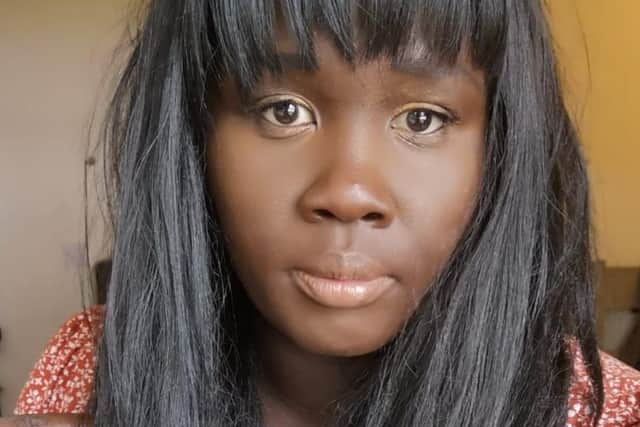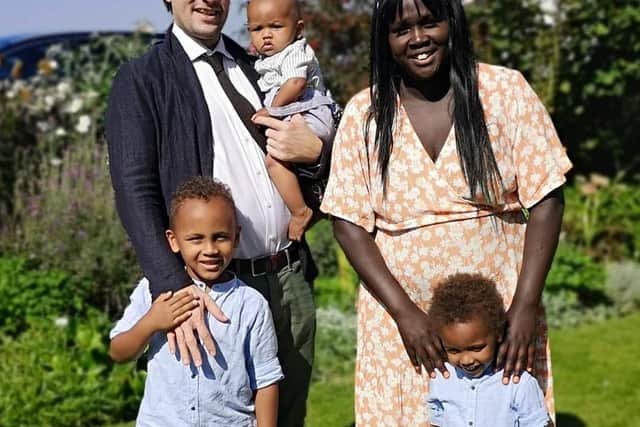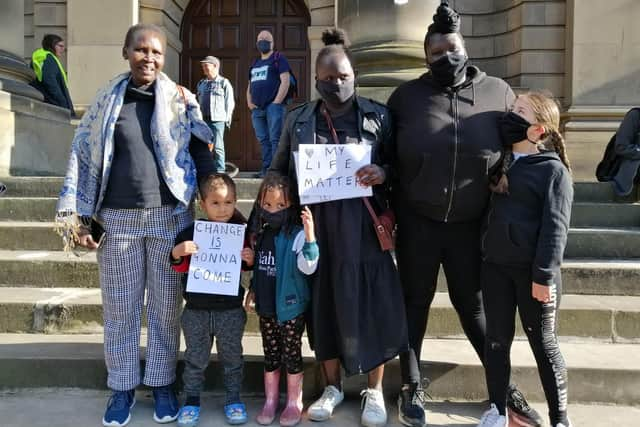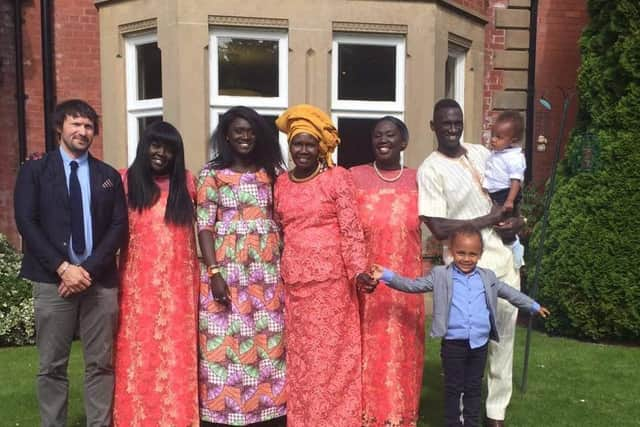Lancaster teacher speaks out about racism and describes life as a black woman living in the city
and live on Freeview channel 276
Describing herself as "the quiet one" in the family - Geraldine's sister Petra made a strong and passionate speech at the anti-racism protest in Lancaster last week - the 34-year-old mum-of-three said she felt compelled to speak out given the recent events in the US and here in the UK.
Now living in Bolton-le-Sands with her partner Joe and three boys Nate, seven, Seb, four, and Eli, one, Geraldine said Lancaster had "progressed" over recent years, and that she was overwhelmed by the show of support for the Black Lives Matter movement in the city.
Advertisement
Hide AdAdvertisement
Hide AdThere have been protests globally following the death of George Floyd in Minneapolis, which Geraldine described as "just the tip of the iceberg".


She said that she, along with members of her family, had experienced racism whilst living here in Lancaster - from childhood to more recent times.
Geraldine's family fled the Sudanese Civil War in the late 1980s, and came to the UK after her father Dr Leonzio Onek won a scholarship at Lancaster University to study medicine.
Geraldine was two, and her sister Petra was a few months old.
Advertisement
Hide AdAdvertisement
Hide AdTheir younger siblings William and Naomi were born in Lancaster.


After struggling to find work in his field in the UK, Leonzio later returned to Africa and became a lecturer in Kenya, and Geraldine's mother Angela brought up their four children on her own.
But Geraldine said that despite the break up, both parents placed a huge emphasis on their education, resulting in all four children attending the boys and girls grammar schools in Lancaster.
She said: "When I look at what has happened over the last week, I have been overwhelmed.
Advertisement
Hide AdAdvertisement
Hide Ad"When I saw what happened to George Floyd, I immediately thought this is just the tip of the iceberg, and my reaction was 'that's enough'.


"The UK is not innocent and my frustration and anger comes from people seeing it as an isolated incident.
"I see comments on Facebook and quite often I get frustrated and don't say anything, I'm usually the quiet one, but after everything that has happened, I couldn't stay quiet."
Geraldine said that she had suppressed a lot of memories of racism during her life.
Advertisement
Hide AdAdvertisement
Hide AdShe said a friend called her this week and said 'do you remember crying in the playground because no-one wanted to play with you because you were black, and I came over and played with you?'


"I didn't remember that," she said.
"It's easy to suppress it.
"I did experience racism at school but my parents quickly called it out.
"My mum was a single parent, she worked hard cleaning at Sainsbury's to give us extra tutoring, and three of us went to uni.
"I went to Moorside Primary and I was the only black child there.
"You could spot me a mile off, and we always stood out."
Advertisement
Hide AdAdvertisement
Hide AdGeraldine said she experienced racism in a restaurant near Lancaster two or three years ago.
"Me and my partner were the only ones in there at the time," she said.
"There was sniggering, staff staring at us out of the kitchen.
"We left in the end, but I left a comment on their Facebook page, and rather than being apologetic, they were very defensive.
Advertisement
Hide AdAdvertisement
Hide Ad"In the end I received an apology from their CEO, who said they would reprimand the staff and carry out training.
"I'm always well aware when eyes are on me - people will snigger and look me up and down.
"When I go away with friends I'm the only black person in the group.
"I went to Prague on a hen do and I was stared at a lot.
"It wasn't until I pointed it out that my friends realised what was happening."
Advertisement
Hide AdAdvertisement
Hide AdGeraldine described how her uncle, who lived in Lancaster for a while, would walk home after a meal at her house, and would be regularly stopped by the police.
"He wasn't doing anything wrong, but because of his profile as a tall, black man, he was stopped and searched," she said.
"Lancaster has progressed recently though.
"There are more students from different places and more families with diverse backgrounds.
"When we first came here there were very few people of colour."
Advertisement
Hide AdAdvertisement
Hide AdGeraldine said she often sees what she calls the "black nod" which she translates as "I see you, you're not alone."
She recently moved to Bolton-le-Sands with her family, and is taking time off from her career as a primary school teacher to raise her children.
"People think racism is plain," she said.
"I have three boys of mixed race and I do worry for them.
"But my eldest son attends Bolton-le-Sands Primary School and he is so happy there.
"It does worry me that things like Brexit seem to make racism acceptable again.
Advertisement
Hide AdAdvertisement
Hide Ad"When I first moved to Bolton-le-Sands, you could see it was a pro-Brexit area.
"Some of the posters in windows made me feel uncomfortable, after all I am a refugee myself.
"But now it's not an issue - I'm known.
"What I do like about the village is the sense of community. It's a nice place to be.
"A former landlord at the local pub did ask if I was from Birmingham though, which was interesting.
Advertisement
Hide AdAdvertisement
Hide Ad"In the end we laughed about it, but I think sometimes people need to think before they speak.
"Some people have no filter.
"This happens in the workplace with slurs passed off as banter, and it happens in the playground.
"Now with technology we're able to document it, and in terms of George Floyd's death, if it hadn't have been recorded, this would have been swept under the carpet with all the others.
"The police are meant to protect us and those officers who stood there and watched it are culpable too - compliance is just as bad.
Advertisement
Hide AdAdvertisement
Hide Ad"I don't want my children to be afraid of the police, but I want them to be aware that there can be racism in every profession.
"The fact that the policeman didn't flinch even though people were watching - and he is charged with manslaughter - it's not enough.
"He killed him.
"We live this daily.
"Currently there are people calling out their racist family members, they are attending vigils, becoming more aware, putting their hands up and saying 'I was compliant' but no more.
"Equally there are people who have kept quiet through this whole thing, but saying nothing is part of the problem.
Advertisement
Hide AdAdvertisement
Hide Ad"I understand some of it is generational, but you have to call it out."
Geraldine said there needed to be more emphasis on black history and racism in the school curriculum.
"A lot of black people are getting frustrated," she said.
"Why should we have to continue to educate and inform?
"No-one is born a racist or a bigot, but as some people grow up, they see it as acceptable.
"As a teacher I have experienced children who are shocked because I'm black and being from South Sudan, I am 'very black'."
Advertisement
Hide AdAdvertisement
Hide AdShe said those who say racism only happens in America are in denial.
"The police here are put on a pedestal, but they can be just as bad," she said.
"It's also got to be pointed out that Lancaster itself has many connections to slavery and oppression and I think this needs to be discussed.
"We're all still learning, but things need to change in schools and parents need to take some ownership too.
Advertisement
Hide AdAdvertisement
Hide Ad"When kids hear about Rosa Parks and learn about Black History Month, they are shocked at what happened.
"It's about breaking the pattern so it's not repeated.
"Some parents are scared that they're going to say the wrong thing, and I get people asking me what kind of things they should be showing their kids.
"People should be asking questions, and they shouldn't feel silly for asking them.
"This is the time for change.
"There are so many resources out there that people can find to educate themselves.
Advertisement
Hide AdAdvertisement
Hide Ad"People can't play dumb anymore. We're tired of having the same conversations, explaining why this is so important.
"If people continue to say 'all lives matter', then they're not ready to listen.
"The conversation needs to continue.
"The lack of justice for black people is part of a much wider issue."
Geraldine said there was a difference between "non-racist" and "anti-racist".
"Compliance is just as bad," she said.
Advertisement
Hide AdAdvertisement
Hide Ad"If someone makes a racial slur, people should be calling it out for what it is.
"People need to be mindful and take responsibility for what they say, but also when they hear someone else saying it."
While not supporting violent action, Geraldine said she understood why people were so angry, leading to many protests across the UK over the weekend, including in Bristol, where a statue of slave trader Edward Colston was pulled down and thrown in the harbour.
"How would someone feel if it was a statue of Jimmy Saville?" she said.
Advertisement
Hide AdAdvertisement
Hide Ad"Colston bought 84,000 black people and 12,000 of those died in transit in awful conditions.
"It doesn't matter how you protest, the oppressor won't like it.
"Basketball player Colin Kaepernick knelt in silence but he was still abused."
Stand Up To Racism Lancaster and Morecambe is planning further action this week.
They are asking people to "take the knee" at 6pm on Wednesday June 10, take a selfie, and post the picture to its Facebook page.